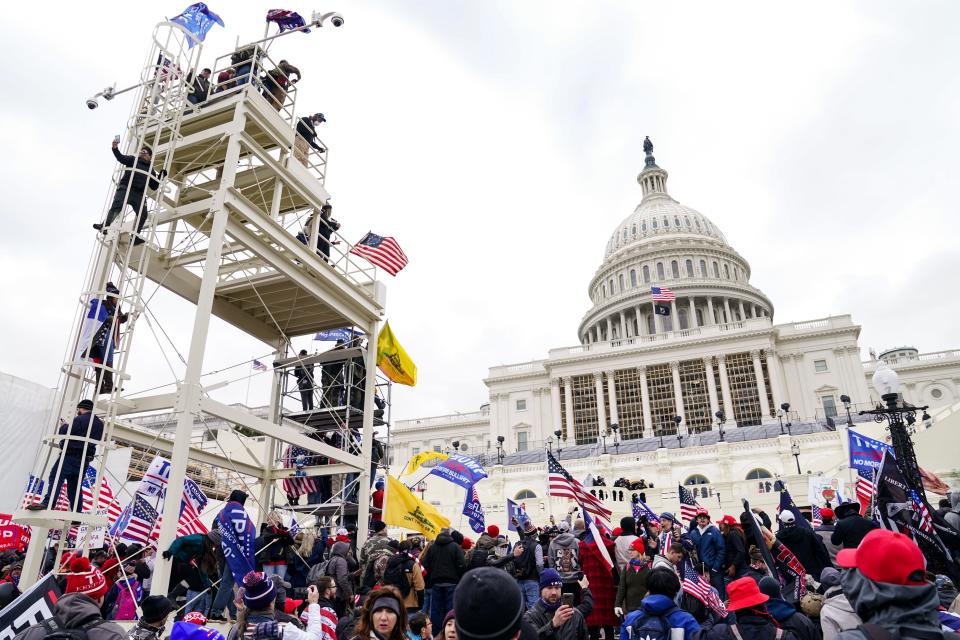Capitol police watchdog says heavy, non-lethal munitions would've helped in Jan. 6 insurrection
The Capitol Police force's response to the deadly Jan. 6 riots was fatally obstructed by a lack of officer training, deeply flawed intelligence analysis and inadequate equipment, the agency's chief watchdog told a House committee Thursday.
In a scathing review of the agency's preparedness, Inspector General Michael Bolton told the House Administration Committee that officers were ordered not to use heavy, non-lethal munitions to repel the attack out of fear that the weapons could cause "life-altering injury or death."
Bolton, who has issued a wave of recommendations aimed at bolstering future response, said the use of the heavy munitions "would have put the department in a better position" to counter the deadly attack.
'Radicalized by hate': Suspect in officer Sicknick assault jailed, new videos show chemical spray

"It certainly would have helped us that day," Bolton told the panel.
Bolton reserved specific criticism for the readiness of the agency's Civil Disturbance Unit, which he described as an "ad-hoc" group of officers who rotate duty assignments as needed.
The inspector general called for a permanent, stand-alone unit to more effectively respond to emergencies.
"In order to be truly effective, you have to have that continuing training," Bolton said, calling for the unit to become a "full-time job" for officers.
"Training deficiencies put officers in a position not to succeed," the inspector general said.
Bolton's review is the latest in series of examinations of the Capitol Police response, all of which have identified serious deficiencies in the agency's readiness.
Last month, a report authored by retired Army Lt. Gen. Russel Honore presented similar findings, and recommended the hiring of hundreds of additional officers to account for more than 200 current vacant positions and improve future operations.
More: Read Lt. Gen. Russel Honoré's full security recommendations for the Capitol after the Jan. 6 riot
More: ‘Jan. 6 changed everything’: Will Capitol riot mark a return to fortress policing?
In February, Capitol law enforcement officials described a series of intelligence breakdowns before the deadly Jan. 6 riots, including failure to adequately distribute an ominous bulletin provided by the FBI the night before warning that protesters were "preparing for war."
Former Capitol Police chief Steven Sund told a joint Senate investigating committee at that time that the FBI report prepared by agents in the bureau's office in Norfolk, Virginia, was received by the police department's intelligence division but was never shared with the agency's command staff.
The new disclosure only underscored what lawmakers described as a "colossal" security breakdown in intelligence sharing, training and equipping officers who were badly overrun by an armed mob bent on halting the certification of President Joe Biden's election.
On Thursday, Bolton's review found deeper obstacles involving the agency's capacity to share intelligence, telling lawmakers that officers assigned to riot duty on the day of the siege were barred from receiving sensitive information because they lacked basic security clearances.
In addition, the inspector general found that top Capitol Police officials, who were cleared to review such information, could not agree on the level of threat they were facing that day.
Breakdowns appeared to afflict every aspect of the agency's operations, including the condition of crucial defensive equipment.
The agency's supply of riot shields, for example, had deteriorated so badly that some shattered on impact.
In the midst of the rioting, according to Bolton, officers were being re-supplied equipment by runners who were forced to move equipment from remote sites instead of pre-staged locations.
"I was dismayed to see decontamination zones (meant to provide relief for officers hit by chemical spray) consisted of cases of water" scattered for officers' use.
Bolton's testimony also comes on the day of funeral services for Officer William "Billy" Evans, who was killed earlier this month when a vehicle rammed a Capitol barricade where Evans was posted.
The vehicle's driver, Noah Green, 25, was shot to death when he emerged from the car and lunged at officers with a knife.
This article originally appeared on USA TODAY: Capitol police barred from using non-lethal weapons during Jan. 6 riot

